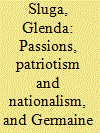| Srl | Item |
| 1 |
ID:
086963


|
|
|
|
|
| Publication |
2009.
|
| Summary/Abstract |
This essay examines the influence of sentimentalism on conceptions of patriotism at the turn of the nineteenth century in order to historicise conventional views of the nature of patriotism as a fundamental human emotion. It uses a focus on the intellectual thought of Germaine de Staël in order to understand how a 'sentimental' view of patriotism took hold at a crucial moment in the European history of the idea of the nation and of the conceptualisation of emotions. I argue that de Staël's ideas and influence lead us to a radical reconsideration of the significance of the emotional history of patriotism for how we explain nationalism.
|
|
|
|
|
|
|
|
|
|
|
|
|
|
|
|
| 2 |
ID:
135228


|
|
|
|
|
| Summary/Abstract |
The world ended up with a League that simultaneously normalized international government and privileged the nation-state as the normative form of political sovereignty.”
|
|
|
|
|
|
|
|
|
|
|
|
|
|
|
|
| 3 |
ID:
165029


|
|
|
|
|
| Summary/Abstract |
Several of the world's intergovernmental organizations have now existed for longer than many nation-states. The centenary of the peacemaking that ended the First World War offers the opportunity of making good policy use of new histories that inform us about the shifting horizon of international expectations, the social dimensions of international thinking and international political cultures, their nation-state roots, and the sum of this relatively marginalized international past. The aim of this article is to draw together the various strands of the new historical work undertaken in the last decade in order to orientate 1919 as a moment that launched the world into a century of often profound discussion about international organizations as necessary instruments of multilateralism. This discussion sometimes dwindled, and it did not prevent wars. However, it had significant impacts: from the spectrum of ideas it brought to bear on the question of how to solve the world's most serious problems, to the practices of international governance it helped introduce. As importantly, the international order shaped in 1919 created unprecedented political spaces for representing the diverse interests of the world's populations, even the stateless. At crucial moments in the twentieth century, world-scale solutions to world-scale problems gave people ideas—even when the window of opportunity was small. If this history is good for anything, I argue that it might be for orientating our present in relation to that international past, and how we begin to imagine the future of the international order, as we know it.
|
|
|
|
|
|
|
|
|
|
|
|
|
|
|
|
| 4 |
ID:
060854


|
|
|